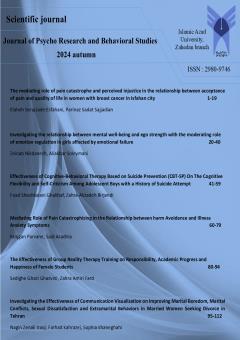Effectiveness of Cognitive-Behavioral Therapy Based on Suicide Prevention (CBT-SP) On The Cognitive Flexibility and Self-Criticism Among Adolescent Boys with a History of Suicide Attempt
Subject Areas : Psychology
Foad Sheshkalani Ghalibaf
1
![]() ,
Zahra Alizadeh Birjandi
2
,
Zahra Alizadeh Birjandi
2
1 - Master's degree in Clinical Psychology, Department of Psychology. Faculty of Humanities. Hakim Toos Higher Education Institute, Mashhad, Iran.
2 - استادیار گروه روانشناسی، دانشکده علوم انسانی، دانشگاه بین المللی امام رضا (ع)، مشهد، ایران
Keywords: Suicide Attempt, Cognitive-Behavioral Therapy based on Suicide Prevention (CBT-SP), Cognitive Flexibility, Self-Criticism.,
Abstract :
The increasing rate of suicide among teenagers is considered an important issue at the global health level. The aim of this research is to investigate the effectiveness of cognitive-behavioral therapy. The research methodology was a semi-experimental pre-test-post-test design with experimental and control groups. The socio-statistics of this research were all male students aged 15 to 18 who had a history of suicidal activity who studied in the Tabadakan district of Mashhad in the academic year of 1401-1402, out of which 40 people were obtained as a sample and in two groups were tested. They were controlled. The experimental group received treatment (CBT-SP) for 12 sessions of 60 minutes in a group and one-session weeks; the control group was placed on the waiting list. Using the data collected using the inferred (CFI) of Dennis and Vanderwaal (2010) and the identified self-criticism (LOSC) of Thomson and Zaroff (2004), their reliability was determined using the Cronbach's alpha coefficient of 0.81 and 0.82 respectively. Analysis of covariance was analyzed. The results of CBT-SP show a significant increase in cognitive acceptance scores, controllability perception components, behavior justification perception, various choices to reduce and become self-critical, internal self-criticism, and external self-criticism. Given that cognitive-behavioral therapy for suicide prevention (CBT-SP) has been shown to improve student recovery in students with self-motivated abilities, this treatment can help as a clinical intervention to reduce suicidal behaviors.


